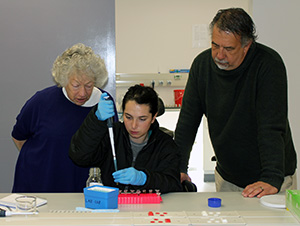Latest News Archive
Please select Category, Year, and then Month to display items
08 May 2024
|
Story Anthony Mthembu
|
Photo SUPPLIED
 From left to right: Prof Philippe Burger, Dean of the Faculty of Economic and Management Sciences (EMS) at the University of the Free State (UFS), presenting an award to Ntswaki Moshwaisi.
From left to right: Prof Philippe Burger, Dean of the Faculty of Economic and Management Sciences (EMS) at the University of the Free State (UFS), presenting an award to Ntswaki Moshwaisi.
A cohort of esteemed academic and support staff from the Faculty of Economic and Management Sciences (EMS) at the University of the Free State (UFS), received well-deserved accolades at the 2024 annual EMS Awards. Notable among them were Programme Coordinator Ntswaki Moshwaisi and Associate Professor Prof Liezel Massyn from the UFS Business School.
Prof Massyn was lauded in the Teaching and Learning category, while Moshwaisi garnered recognition in the Support Staff category at the awards ceremony held on 18 April 2024, on the UFS Bloemfontein campus.
Reflecting on her achievement, Moshwaisi expressed gratitude, stating, “The award serves as motivation to myself to keep working hard and to innovate methods and approaches towards my work.’’
The significance of the awards
Prof Massyn remarked that the awards serve to spotlight the remarkable contributions of both academics and support staff within the faculty. She considers the award as a testament to her dedication, acknowledged by her esteemed colleagues. Both Prof Massyn and Moshwaisi attribute their success to the support they receive from their peers.
Moreover, they emphasise that these awards transcend mere recognition. It will serve as an impetus to the way forward. Moshwaisi envisages leveraging her award to enhance the quality and efficacy of the programmes under her stewardship. Prof Massyn, echoing this statement, asserts, ’’It will strengthen my belief in the transformative power of teaching and make me work harder to provide quality learning opportunities to students. I am a firm believer in following an evidence-based approach and will continue to research learning and teaching.’’
Monkey research attracts international attention
2016-07-11

Prof Trudy Turner from the University of
Wisconsin-Milwaukee and Prof Paul Grobler
from the Department of Genetics at the
University of the Free State, together with one
of the students researching monkey genes.
Photo: Siobhan Canavan
For this year’s Summer School programme, Prof Paul Grobler, from the University of the Free State Department of Genetics focuses on research about the conflict between monkeys and humans in areas where monkeys are regarded as problem animals.
Global expert part of research
This year, Prof Grobler is hosting a group of students and lecturers from the United States of America (USA). The group includes Prof Trudy Turner from the University of Wisconsin-Milwaukee (UWM), a global expert on vervet monkeys. She has been working with the Department of Genetics at the UFS for the past fifteen years, and has also been appointed as an Affiliated Professor in the department.
“The Summer School programme is an opportunity for the American Primatology students to gain practical experience in Africa,” says Prof Grobler.
International interest in Summer School
This year’s Summer School programme involves four lecturers and nine students. The lecturers are from the University of Wisconsin-Milwaukee (UWM), the University of California, Los Angeles (UCLA), Boston University, and Central Washington University.
“We use the genetic information to determine
how monkeys historically infiltrated the
different areas in South Africa.”
This year’s focus is on the genetic structure of the monkeys in South Africa, and research that is being done on the differences and similarities in monkeys from different areas. “We use the genetic information to determine how monkeys historically infiltrated the different areas in South Africa,” says Prof Grobler.
Local nature reserve acting as host
The group will perform field work, including observing monkeys in the Soetdoring Nature Reserve, as well as laboratory work in the department, where they will be assisted by two laboratory technicians.
Two years ago, Prof Grobler and his department tested this idea on a smaller scale, and now they hope to make this a regular event.